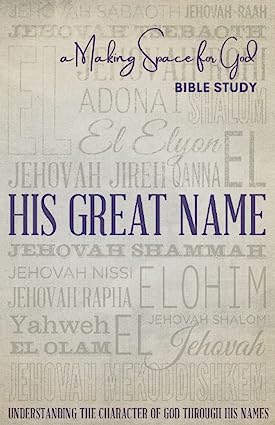This Tuesday will be working through Chapters 9 and 10 of Joanne Ellison’s book His Great Name. The two names were are exploring this week are Jehovah-shalom (God of Peace) and Jehovah-tseboath (God of War).
The second name of God we are looking at this week is Jehovah-tseboath – The LORD of Hosts. “Host” is the Hebrew word for “army” or “warfare.” This name of God first arises in the Book of Samuel where the monarchy becomes established. 1 Sam. 1:3. Jehovah-tseboath appears 266 times in the Bible – almost always in the Old Testament and overwhelmingly in the prophets. It is the LORD of Hosts in whose name Isaiah, Jeremiah, Zechariah, and Malachi speak. This is the name of God that the prophets invoke to bring vengeance and destruction against those who rebel against God, but it is also this name of God by whose vengeance God’s people are restored. Read is a spiritual manner (2 Cor. 3:6), these prophetic pronouncements concerning Jehovah-tseboath are not judgments upon people but against the adversarial hosts of darkness and evil (Eph. 6:12), the destruction of which brings about the restoration of the image of God within us all.
One of the detriments of using a common liturgy, is that often in familiarity we lose the gravity of what we say every Sunday. From the most ancient Eucharistic liturgies to Rite II in the 1979 BCP, the Church repeats that hymn sung by the Seraphim in Isaiah’s vision: “Holy, holy, holy is Lord God of Hosts! The whole earth is filled with his glory.” Isaiah 6:3. The Hebrew of the Subject of the hymn is Jehovah-tseboath. “Tseboath” meaning “army” from the Hebrew “tsaba” meaning war. The seraphim are the angels whose name means burning. (This is also the root word for serpent because the poisonous bite of a snake burns.) The seraphim tend the charcoal which creates the smoke and incense that surrounds Jehovah-tseboath, and they use this charcoal to burn, and thereby cleanse, the lips of the prophet. Isa 6:6-7. For tonight, think about what we are doing when we join our voices with the Angels and Archangels to forever sing this hymn to the Lord God of Sabaoth – this God of Power and Might to whom only those who have been made Holy can approach. And think about what is occurring at the Eucharist if this our offer of praise and thanksgiving is being made to Jehovah-tseboath.
Dinner is at 6. The menu is chili. Discussion about 6:45. Hope to see you here.
O Yahweh Elohim Tsebaoth, how long will you smolder in anger
Psalm 80:4-7
against the prayer of your people?
You made them eat tears as food.
You often made them drink their own tears.
You made us a source of conflict to our neighbors,
and our enemies made fun of us.
O Elohim Tsebaoth, restore us and smile on us
so that we may be saved.

